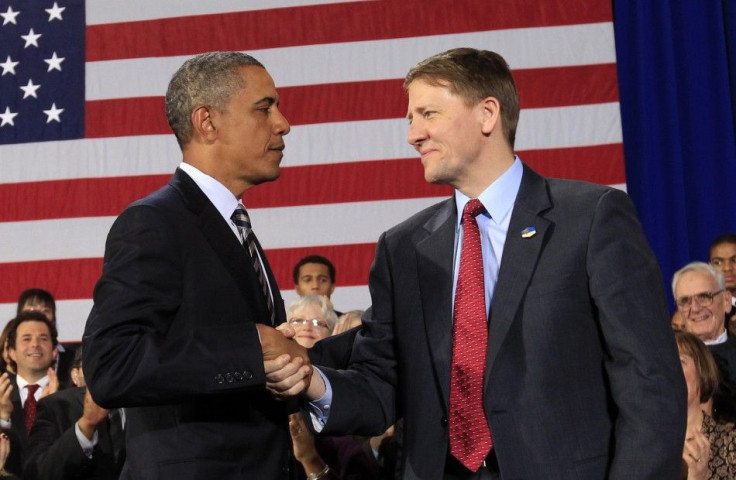Richard Cordray's Attorney General Days Lay Foundation for CFPB

President Barack Obama decided Wednesday to thumb his nose at Republicans in the Senate who oppose the new Consumer Financial Protection Bureau and appoint Richard Cordray to run the new agency while Congress is in recess.
Cordray's recess appointment is a welcome development for proponents of the leaderless consumer bureau, although their preferred choice was Elizabeth Warren, the agency's architect and Harvard law professor who is now running for the Senate in Massachusetts.
Nonetheless, Cordray, Ohio's former attorney general, has a resume that would make any 99-percenter confident in his ability to crack down on Wall Street malfeasance, even if he is a mild-mannered alternative to Warren, who famously said she wanted a strong consumer bureau or none at all with "blood and teeth on the floor."
When Obama announced Cordray as his pick for CFPB director over Warren, she praised the man she snatched up to run the bureau's enforcement division following his re-lection defeat as Ohio attorney general in 2010.
"Republicans on the Hill have made it clear it can't be me. So be it. I'm glad we got somebody else who's tough and strong," Warren told Fox Business in July.
Ohio's Top Attorney
Cordray made his name for himself during his brief two-year tenure by firing a clip of lawsuits in the wake of the financial meltdown, securing more than a billion dollars in settlements.
He accused major banks and their executives and insurance brokers of securities fraud and misleading investors. Fannie Mae and Freddie Mac were forced to fend off securities lawsuits from Cordray.
He also targeted -- albeit unsuccessfully -- the credit rating agencies that gave sterling ratings to mortgage-backed securities that turned out to be junk.
In 2009, Cordray took the reins of a case against Bank of America and its CEO Ken Lewis over the banking giant's 2008 acquisition of Merrill Lynch. He accused the companies of hiding losses from shareholders who had yet to sign off on the merger and failing to disclose a deal to pay Merrill Lynch executives up to $5.8 billion in bonuses.
Cordray, whose home state was hit particularly hard by foreclosures, also sounded the alarm on improper "robo-signing" of foreclosure documents, which resulted in a suit against GMAC and its parent, Ally Financial, seeking $25,000 for each violation. He also sent letters to Wells Fargo and Citibank requesting meetings with his office about improper foreclosure practices and requested JPMorgan Chase and Bank of America to halt evictions in foreclosure cases involving employees who rubber-stamped court documents.
Cordray used Wall Street as a punching bag in his 2010 re-election campaign, but was unable to best his Republican challenger Mike DeWine, a former U.S. senator who had been ousted in the Democratic wave of 2006.
Vision for the CFPB
While Cordray's notoriety as attorney general consisted of racking up lawsuits and settlements against some of more well-known corporations and Wall Street firms involved in the economic meltdown, he has indicated that there will be a focus on the smaller, non-bank financial companies that still give some consumers nightmares, like pay-day lenders and debt-collecting agencies.
He told The Wall Street Journal in February that such firms operate on "much more of a wild and woolly basis."
This focus dovetails into his goal to work with the nation's state attorneys general, a highly visible position that wields much influence in the realm of consumer protection. President Bill Clinton once famously remarked that being Arkansas' attorney general was the best job he ever held.
Now, under the Dodd-Frank financial reform law, state attorneys general will have an easier time working with federal officials on consumer protection. This would be a departure from the days of federal regulations attempting to trump state consumer statutes that are often more robust.
"Dodd-Frank has made an effort to lift pre-emption in a lot of areas," Cordray told Bloomberg in December, adding that there could be "joint enforcement authority with this new bureau and state attorneys general."
This was the kind of relationship Cordray the attorney general has said he wanted to see in a "single focused agency," one that can "work directly with the states on consumer protection at the national level."
As he told the Journal's MarketWatch during his time as attorney general, "We will be able to enforce federal law, and we are the ones that tend to know what is going on within our communities... We have more resources locally, and know what's going on, on the ground."
© Copyright IBTimes 2024. All rights reserved.





















